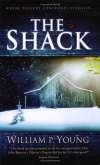 There are so many reviews that have done a fine job of explaining the pros and cons of this book that I don’t feel I need to go into this for very long.
There are so many reviews that have done a fine job of explaining the pros and cons of this book that I don’t feel I need to go into this for very long.
First, I’ll just say that after reading it, the picture of God’s sovereignty and reasons for ordaining that suffering be are attractive, though in my view, insufficient (see the book of Job or Romans 8 or John Piper for a better explanation). Also, the concept that God the Trinity is eternally happy in Himself (see Jonathan Edwards’ works) is refreshing. The emotional tug of the book (which made me cry at points, it really is a heart breaking story) gives great weight to its attractiveness in a culture absorbed in emotional appeal and presuppositions. Those emotional aspect of the book really caught my attention and I thought Young did a good job of making Mack’s situation enrapturing. I was really able to put myself in his shoes. And it is overwhelming considering the weight of that pain.
But the over-riding issues with the unbiblical portrayal of the Trinity in terms not prescribed in Scripture as well as the authors’ outright denial of penal substitutionary atonement (which does show up in the book implicitly) gives me grave concerns about how much people take away from it concerning what is actually true about God (given to us by none other than God Himself in Scripture). Of particular concern, for example, is the statement in the book that the Father (Papa) “doesn’t need to forgive sin”. He just loves us, without any regard for His justice and holiness that have been divinely and treasonously violated.
This and other statements, that are completely detached and empty of any comprehensive, Biblical truth, are dangerously close (if not equal to) the universalist claims of theological liberals that in the end, all people will be saved, when the book of Revelation (a prophecy of the end of time and judgment seat of Christ) is very clear that many many people will indeed go to eternal judgment. Jesus Himself was unequivocally clear on this in Matthew 7.
All that to say, if you read it, read it with a giant piece of kosher sea salt. Go into it knowing the author has some messed up unorthodox views and be aware of the universalism and denial of a core tenet of the Gospel.
Here are a few subsequent articles:
Shack Author William P. Young Denies Penal Substitution (MP3):
http://www.davidwesterfield.net/2009/03/shack-author-william-p-young-denies-penal-substitution-mp3/
Cursed is Everyone Who is Hanged on a Tree:
http://www.davidwesterfield.net/2009/03/cursed-is-everyone-who-is-hanged-on-a-tree/
The Shack is a Fictional Portrayal of God?:
http://www.davidwesterfield.net/2009/03/the-shack-is-a-fictional-portrayal-of-god/
A Position Based Purely on Emotions:
http://www.davidwesterfield.net/2009/04/a-position-based-purely-on-emotions/

Jon Dansby
Great review, Dave. I’m with you. My enthusiasm for the book definitely waned quite a bit when I discovered Young’s anger at the precious doctrine of substitutionary atonement.
David
Yeah it’s so unfortunate things that catch on like that can’t be both enthralling and spot on, but so goes the history of man and the church.
Grace
Hey David, I appreciated your review. After hearing SO many people in total awe of the book, I read it, and was increasingly disappointed. Though the story is heartwrenching at points, especially if you are a parent, I could not get past the clear misuse of the Bible and what it teaches us. It just left me with a pit in my stomach that so many people, especially Christians, were taking this sort of theology to heart. I almost feel like the odd man out when I express any doubt about the book or attempt to fish out of Shack lovers what they are REALLY thinking about the Trinity/other biblical concept misuses. It is very refreshing to hear someone that I know express their hesitation.
David
Thanks! Yeah, it’s like a whole lot of other things in our entertainment culture (of which Christian culture is very much apart of and heartily endorsing) where if it’s a good story and pulls at your heart strings, no one can say anything critical about it, even if there is blatant heresy laced throughout it. We really like to think more with our hearts and feelings first instead of stopping and putting the information through a Biblical grid and setting emotions aside long enough to check its authenticity for Biblical truth. It’s sad … and this book is one more example I’m afraid of the church succumbing to secularism and worldly philosophies and notions about the nature of God and man.